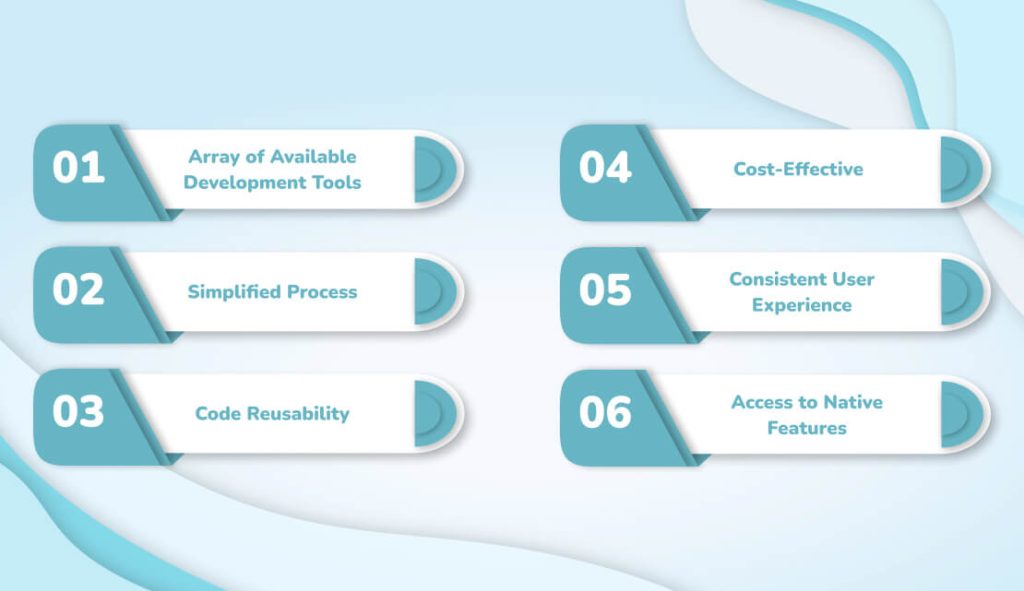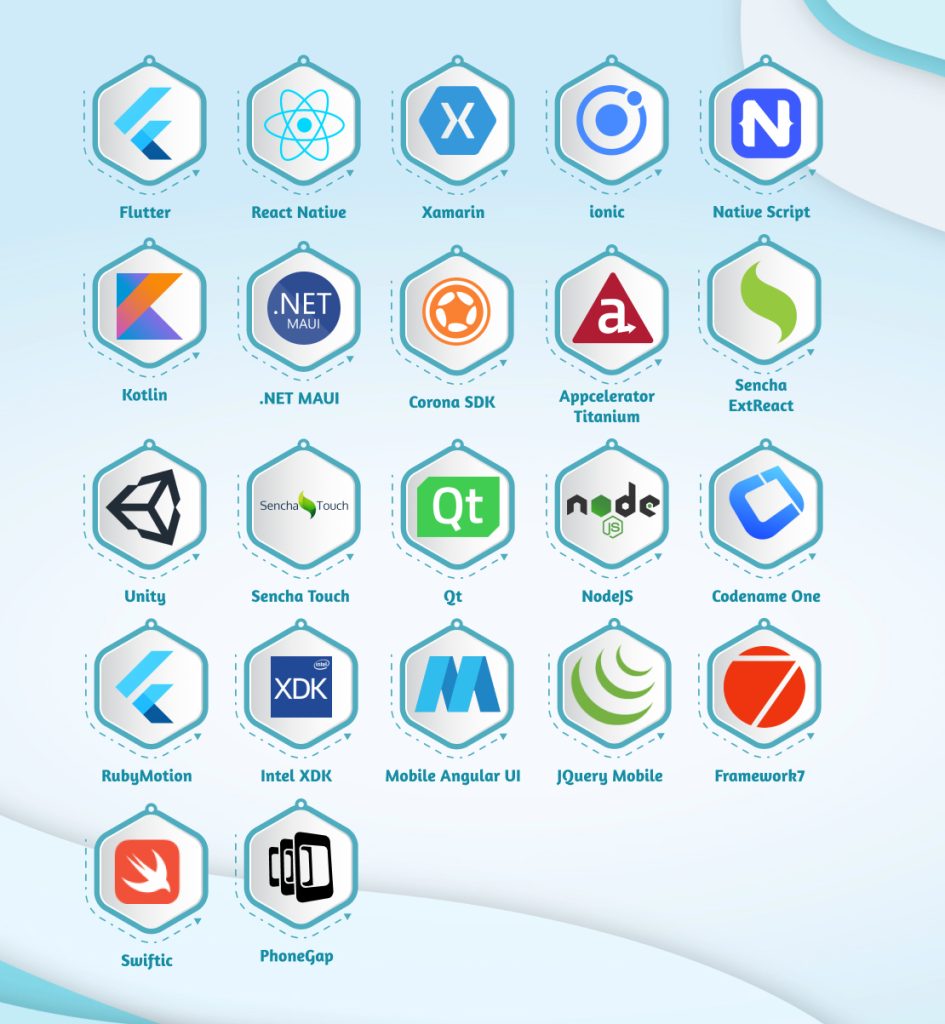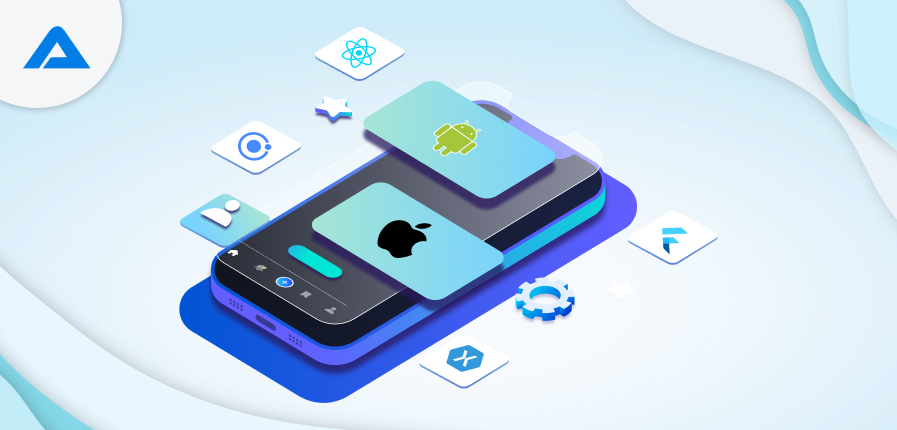Cross-platform application development has advantages that are integral to its current popularity. With the growth of its popularity, various cross-platform app development frameworks and tools began to appear on the market, slowly and then at once, together with every other company that develops mobile apps, testing their hand at this unique and innovative technology.
This means that developers now have a variety of frameworks and tools that they could feel overwhelmed with. To aid you in your search for the best and most effective cross-platform framework, here’s a list of top frameworks for app development, including node.js react, flutter, PhoneGap, and others.
The frameworks they use are based on JavaScript. Therefore, getting a solid grasp of JavaScript is crucial before moving forward.
Come along as we dive into the realm of cross-platform development and discover the strength and possibilities of these frameworks to bring your most innovative mobile app ideas to come to. You may be an entrepreneur with an original idea or a developer who wants to improve the process; the realm of cross-platform mobile app development has endless possibilities waiting to be explored and taken on.
What is a Cross-Platform Mobile App Development Framework?
Mobile engineers utilize cross-platform frameworks to develop native-looking applications using the same codebase. Sharing code is a significant advantage of this method over native application development. With one codebase, mobile developers can reduce time and effort by not having to write code for every operating system, speeding up their growth.
The need for cross-platform mobile app development and the variety of available tools on the market is also growing. Our summary includes the programming languages that these frameworks are built upon and their primary features and benefits.
Benefits of Cross-Platform Mobile App Development for Businesses

As with most businesses, you want to reach as wide an audience as possible. More customers mean a higher income base.
In the same way, you don’t need to create native applications for each operating system. Separate apps cost much money and typically take longer to create. This is why the mobile cross-platform development method is beneficial.
The time it takes to market two to three apps developed for various platforms is significantly shorter than the time you have to create an individual native app for every platform. This lets companies get their message out to the right audience quicker, regardless of their platform.
But, before creating mobile solutions for both platforms, you need to understand all the advantages and disadvantages of developing cross-platform mobile apps. Let’s begin by examining the problems associated with this approach and then examine the advantages you could reap.
Array of Available Development Tools
It’s an ideal time to take advantage of this strategy because increasing tools appear in the marketplace. Various technologies are available to aid developers in developing these kinds of applications. They include Xamarin, React Native, Ionic, Titanium, PhoneGap/Cordova, and more.
Each tool has advantages and drawbacks and requires expertise in a specific programming skill. It is essential to choose one with care as it could make you a part of a particular technology stack.
Simplified Process
The goal of AddWeb Solution is to simplify the process for our customers. This is why we offer a cross-platform solution. To do this, allow an efficient and straightforward method to present your solution.
It is a great starting point for any business that wants to access multiple mobile platforms and through time or budget constraints. Our team follows a proven process with an unambiguous line of communication and an iterative development process with specific milestones.
Code Reusability
This means developers can write separate code for some platforms, which increases the quantity of software to be developed and maintained. This will, in turn, help save time and resources in this development process.

Need a mobile app? We have a dedicated team just for you. You’ll be talking with our technology experts.

Pooja Upadhyay
Director Of People Operations & Client Relations
Cost-Effective
Cross-platform app development is cheaper than creating separate applications for each operating system. It also helps reduce maintenance costs by bug-fixing
Consistent User Experience
Cross-platform applications provide users with a consistent experience across different devices. The application appears and feels the same across every platform. A consistent experience across all platforms can increase user satisfaction and loyalty, leading to higher participation and long-term retention.
Access to Native Features
Cross-platform frameworks allow developers to access native functions and features that the devices provide, such as cameras or GPS. This can improve the user experience and offer specific features for every platform.
Future-Proofing
Making cross-platform apps helps protect companies against changes to the marketplace, such as shifting the operating system’s market share. Apps can easily be adapted to run on different platforms or devices without starting completely from scratch.
Top Cross-Platform Development Frameworks to Choose in 2024

Picking the right cross-platform application development framework will depend on several aspects, such as performance, supported platforms compatibility with third-party libraries, customization options and development times, and community support.
These elements will, in turn, be contingent on your budget, timeframes, expectations for performance, intended user experience (UX), and customization requirements like incorporating customized elements, etc.
Now is the time to find the most effective frameworks that offer the tools needed to create a highly efficient app. Learn more about the frameworks in more detail in this article:
1. Flutter
In discussing the best cross-platform apps, Flutter is the first name that pops into our heads. Anyone with a basic understanding of mobile app development services understands why Flutter is among the highly acclaimed cross-app development frameworks. It has an impressive percentage of 46% use by software developers across the globe.
2. React Native
Created and developed through Facebook, React Native is an extremely popular framework for building mobile apps. It allows developers to utilize JavaScript and React to build native-like applications running on iOS and Android platforms.
3. Xamarin
Xamarin was first introduced in 2011 as an unofficial cross-app mobile apps development platform but was later bought by Microsoft in 2016, giving it more credibility.
It’s an open-source framework that was created to tackle the issue of disjointed native technology stacks, which makes the development of mobile apps costly and difficult.
4. Ionic
It is among the cross platform mobile apps frameworks that work on AngularJS. Developers can use this framework to gain access to native language integrations, such as HTML5, CSS, Cordova wrapper, and JavaScript.
Developers can use an ionic framework to create a stunning user interface while keeping it simple. Furthermore, Ionic achieves this goal by ensuring the applications are as dynamic as native.
5. NativeScript
NativeScript is described as an incredible free cross-platform framework based on JavaScript. It’s safe to conclude that NativeScript is preferred for developers seeking WORA capabilities.
NativeScript also provides native APIs and developers the possibility of integrating existing plugins directly from NPM into their projects.

6. Kotlin
Kotlin Multiplatform Mobile is an SDK JetBrains developed to build Android and iOS applications. It lets you create common code for both platforms and write code specific to the platform only when essential, for instance, when you require custom UI components or work with APIs specific to the platform.
7. PhoneGap
It is an open-source application development framework that can be used to develop cross-platform mobile applications with technologies such as HTML, CSS, and JavaScript. There are numerous advantages to making cross-platform apps, including the following.
If you’re an experienced developer, you can swiftly move to mobile app development with the advantage of PhoneGap.
Apache Cordova also provides access to device features such as camera features, GPS, and a variety of other plug-ins.
Numerous operating systems are supported in PhoneGap, including IOS, Android, windows, and many more.
8. .NET MAUI
In the field of cross-platform app development, .NET Multi-platform UI (MAUI) can be a key player and an improvement of Xamarin. This open-source mobile framework lets developers create apps that can be used on different platforms with the same codebase. Modernized approaches to application development allow quicker delivery and maintenance while delivering high-quality native applications. It works with Android and iOS platforms, macOS, Windows, and MacOS, making it among the most adaptable cross-platform frameworks currently available.
9. Corona SDK
Corona SDK stands out as one of the best cross-platform frameworks in the world of cross-platform app development. Its efficiency and speed effectiveness, known as the Corona SDK and open-source mobile application development framework, are popular for developers who want to develop applications that can be used on various platforms.
Corona SDK, also known as Solar2D, is a powerful platform that allows developers to create top-quality games and applications for mobile and desktop devices. It is compatible with iOS, Android, Windows Desktops, and Apple TV. The benefit of Corona SDK lies in its simplicity. It is based on its Lua scripting language that allows the development of apps to be simple but adaptable.
10. Appcelerator Titanium
Appcelerator is an open-source platform that is free to download. It allows users to develop native mobile applications using HTML5, JavaScript, CSS3, and TypeScript techniques. Through its unified codebase, Appcelerator will enable developers to work with the same codebase across all platforms.
As one of the most popular choices for developers, Appcelerator permits 90% of reuse code across all platforms.
11. Sencha ExtReact
Sencha provides an open-platform framework called Sencha ExtReact, allowing web and mobile app developers for mobile and web applications development using one code base. It is built upon the powerful JavaScript library React. It combines the potential of React with Sencha’s huge collection of UI components to build cross-platform mobile and web applications.
12. Unity
If you plan to develop games that cross platforms, it’s best to use Unity. It’s a renowned game engine suitable for developing cross-platform games. It is compatible with various platforms, including desktops, mobile devices, VR/AR, and consoles. Creating a top-quality gaming application with Unity that supports 25 platforms, including Android and iOS, is easy.
13. Sencha Touch
This framework for hybrid app development across platforms was introduced around a decade ago and has assisted developers in creating various cross-platform web-based apps. Presently, Sencha Touch has been combined with Ext JS.
With this framework, developers can create efficient applications using hardware acceleration techniques.
14. Qt
It is a completely free and open-source toolkit dubbed “cute.” It allows developers to develop visual user interfaces and apps across platforms. They can be used on every platform, including iOS and Android, and operating systems such as macOS, Linux, and Windows.
The QT framework allows you to run an application on a different platform without any changes in the source code.
Qt provides tools to facilitate the entire app development process. It provides tools to create prototyping designs, devise methods to develop and test apps, and finally, deploy the tools to launch applications on various platforms.
Numerous big brands, including PEUGEOT, Mercedes-Benz, and LG, utilize Qt to develop their software. It is available under both open-source and commercial licenses.
15. NodeJS
Node.js is a free and open-source app design framework for creating applications that run on servers and networks.
Ryan Dhayal invented it in 2009. It was developed using Google’s JavaScript V8 Engine. Due to its powerful capabilities and features, it is also utilized by startups and established companies.
16. Codename One
Codename One is a revolutionary mobile application developed by ex-Sun Microsystems engineers built on the work that began in Sun.
Its primary appeal is its accessibility to native platforms, which allows developers to write native code using Java or Kotlin and gain access to all the features that the native mobile platform has to offer.
17. RubyMotion
The Ruby programming language is typically used for web development. However, with RubyMotion, mobile applications can also be developed using Ruby.
RubyMotion is an implementation of MacRuby, a version of Ruby developed and maintained at Apple. RubyMotion was adapted and extended to MacRuby to work on different platforms that are not MacOS.
Apps created in RubyMotion integrate with native platform APIs and function the same way as native languages for the platform. RubyMotion applications are developed via the command-line terminal using an editor for text.
18. Intel XDK
Intel XDK is a cross-platform framework for mobile app development that works with all app stores. It lets you create applications using plugins, res, responsive apps, interactive apps, and web services that work on any device. This framework, ideal for mobile apps, allows developers to create, test, emulate, analyze, and release the application. They’ve been working on improvements within the framework recently and can now support software for IoT application development.
Intel XDK is a framework for app development that gives you a live view of the changes you make while developing your application. The drag-and-drop option is also available to build simple apps, but it can generate several unnecessary codes.
19. Mobile Angular UI
Mobile Angular UI is an excellent hybrid mobile web app framework. It is especially useful for people who like the Bootstrap and Angular frameworks. Mobile Angular UI combines Bootstrap and Angular frameworks, allowing you to create using HTML5.
It is crucial to know that Angular provides excellent server-side support and can easily run complicated applications.
The mobile app development framework lets developers use fastclick.js and overthrow.js to provide an effortless mobile experience. This framework is free and available for use under the name MIT.
20. JQuery Mobile
JQuery can be described as an HTML5 framework designed to run mobile applications. The most significant benefit of developing mobile apps with JQuery is that only an underlying version has been created and can be used across all devices. Whatever is developed with this framework, whether it’s an application or website, it can run not just across all devices but across a range of operating systems, including Android, iOS, Blackberry, Windows, Firefox Mobile, Kindle, Nook, and MeeGo.
You can download JQuery or the most current stable version in a customized download. JQuery is a good option when there is a need for quick development of applications using the plug-ins included in JQuery.
21. Framework7
This framework, which is free to develop mobile apps, is a great tool to develop hybrid applications that work on Android and iOS. It has amazing, easy options, such as support for multiple views, library agnostic native scrolling and cache browser history, caching, etc.
This framework is also helpful in creating a quick prototype of an application. This is an excellent benefit to mobile app development firms when they need to provide clients with an initial concept of the app.
22. Swiftic
Swiftic is among the most popular frameworks for mobile app development in 2023, available via iOS. iOS platform. It comes with an easy-to-use interface. Swiftic is a good option because each plan has a 30-day money-back guarantee. Additionally, it offers an additional half-year of a successful program. If you do not get any results, a half-year subscription is free.
The Key Takeaway
It is essential to select the best framework for app development, which is based on various aspects. Considerations like development skills, project requirements, expertise of mobile app development company, and business goals are essential when evaluating your performance with application development services. Basic knowledge of JavaScript, HTML, and CSS is necessary to enter the world of web development.
The selection of the best framework for cross-platform apps is an important choice that could significantly impact your app’s success. The framework you choose to use will depend on various factors, including your requirements for your project, your team’s knowledge, your app’s specific features, and performance requirements.
Cross-platform app development is constantly changing, so staying abreast of the most recent innovations in the industry is vital.
FAQ About Cross-platform Mobile App Development
A framework for cross-platform app development is an array of tools that allow you to work with one code base to create native or native-like applications for various platforms, including Android, iOS, Desktop, and Web.
Utilizing sophisticated platforms, advanced tools, and cutting-edge technology, we can build top-quality applications that offer users consistent experiences across platforms and operating systems, which will contribute to the success of your business.
Using cross-platform frameworks for development can save time and provide substantial savings in costs compared to creating distinct applications for every platform. Additionally, they offer many benefits and features that significantly benefit companies.
There is only one universal solution for selecting the ideal app development framework. The framework selection is based on many aspects, such as the project’s requirements, team knowledge, edge, and the targeted platforms.
The choice of the best cross-platform framework depends on your preferred programming language and the platforms you intend to target. More than one-size-fits-all framework can be used for cross-platform app development.

Ready to Build a Scalable Mobile App for Your Business? Get an Accurate and Precise Cost Estimation Today!

Pooja Upadhyay
Director Of People Operations & Client Relations

